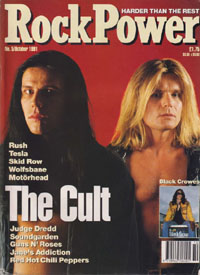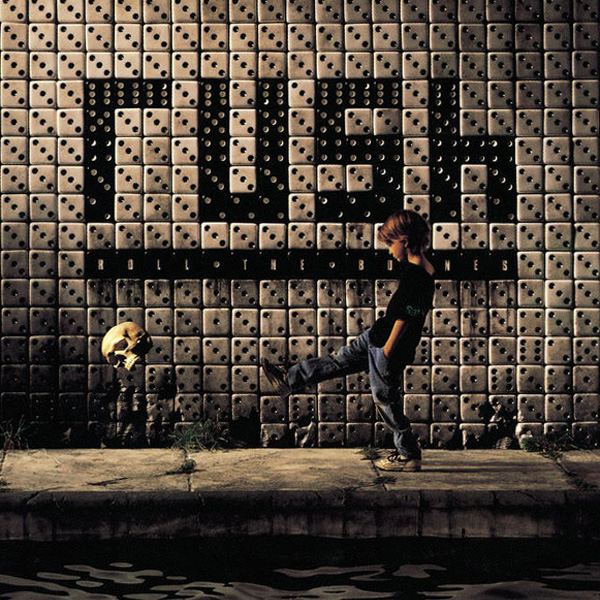The Bonesman
By Andy Stout, Rock Power, October 1991, transcribed by pwrwindows
After nearly twenty years on the cutting edge, Rush are back with their seventeenth album Roll The Bones. Andy Stout talks to frontman GEDDY LEE and finds them moving away from their cybernetic past.

Way back in the Toronto autumn of 1974, the embryonic Rush that had just taken on board new drummer Neil Peart could never have guessed where they'd end up. Only people with DNA direct from the cells of Nostradamus might have figured that out. A multi-platinum band that can play in huge stadiums throughout the industrialized world was almost unheard of then. One that could do all that and still vigorously push themselves to the limits of experimentation and way beyond at almost every album couldn't even have been guessed at.
Still, that's exactly what Rush have done, and in doing that they're one of the only bands left over from that era that have managed to retain their credibility. Peart's influence as a consummate drummer and one of the most intelligent lyricists working in the metal field saved the early incarnation of Rush from their doom as a sub-Zeppelin bar band, and they embarked down a grandiose and technically astonishing (though slightly silly) fantasy period of their career.
"I try not to be too critical about it," says a philosophical Geddy Lee, Rush lead singer and bassist about their early period. " I went through a period where the earlier stuff we did as a band... you get kind of embarrassed by it, like looking at a high school photo. But at this stage I've just got to rationalize it, put it in perspective: that’s what I was at the time and that's the kind of music we did. It's dated, I guess that's the best way to describe it. It seems dated to you but you try to appreciate where you were at at the time but they're all stepping stones to where you are now. The great rationalization is, 'Well I couldn’t be doing what I am doing now if I hadn't have done that.''"
And what Lee, Peart, and guitarist Alex Lifeson are doing now is trying to throttle back from the computer complexities they found themselves tangled up in towards the end of the eighties. Each album Rush have ever released has built on the skeletons of their previous work, a dancing and pirouetting evolution twisting and shaping the Rush sound through time. The fantasy period having lasted through to Hemispheres at the tail end of the seventies, the trio were among the first to utilize the new tech that the development of silicon was yielding. Simultaneously cutting back from ten-minute fantasy bio epics to sharp structured multilayered songs, Rush forged into totally new areas of musician working hand in diode with computer enhancement.
They produced some of the finest rock that the eighties threw up, and easily some of the best of their long career, but Geddy Lee has a few misgivings about the period.
"I think we kind of overdosed in the world of computer technology," he says, "and the last couple of records have been a move away from that and back to a more organic, for want of a better word, style of writing and playing. Reapproaching our trio format, but with a little more looseness than we did five, six, or seven years ago. That's the direction we're moving in, more concentration on a looser style of writing and playing."

Listening to Rush, and especially seeing them live though, it is frighteningly easy to see them as the thin edge of a wedge extending back into a vast array of megabuck cutting-edge technology. The meat parts of the cyborg running around while the mainframe pulls the strings. Are you using the technology, or is using you?
"Well I think a couple of albums ago I was definitely feeling, I don't know if trapped is the right word, but I felt like breaking away from it. Our writing was becoming formulaic. By using these tools there's a kind of method that you go through, you spend so much of your time staring into computer screens and somehow it seems a little too far removed from the heart of the song. The last couple of records writing on guitars and basses and concentrating on vocal melodies and the main spirit of the song first is a more rewarding way of doing it. Bringing computers in afterwards when you want to enhance or use them strictly as an arrangement tool seems to make more sense to me now because then you have something that's come out of a more natural way of writing.
"I remember quite specifically one of the people that I work with who supply me all my computers and things like that setting up this mammoth computer set-up, I mean I had so many television screens in my little writing corner of the room it was completely ridiculous, and I still couldn't get a ball game on any of them. So I'm sitting there with all this junk around me, really expensive junk, and I remember looking at Alex and him looking at me and going, ‘Do we really want to use all this stuff?’"
On Roll The Bones they didn't. The result is an album that updates Rush to 1991 but with slightly more humanity than its recent ancestors. It's the sound of a band that’s a lot comfortable with the way it's operating now. Simply put, a lot more focused.
"I'd say focused is a key word there," muses Geddy. "I think Presto was a bit of a reaction to the previous record, where this album was a lot more definite.
"I don't think it was something in our sound that was affecting us negatively, I think it was a mode of operation that was feeling like we were confined. The same thing happened after we finished the Hemispheres album years ago, when we were approaching material that was ten minutes plus long it almost felt like a formula, and every time it feels like that you want to do something else.

"After we finished Hold Your Fire, writing in that way started to feel like a formula, and it just felt like it was time to do something a little bit different again and bring a bit of freshness in."
After approaching twenty years as a band, freshness is something held at rather a premium. All of them have extensive out of band interests to help keep them sane; Geddy's an avid baseball fan, Neil cycles something approaching fifty miles a day, and Alex has just heavily got into golf and is deservedly taking vast amounts of stick for it. Still, it must be frighteningly easy for it to all go stale.
"I don't know why it is that we've been able to stay together in a sense of freedom as it were. Maybe it’s because we don't plan what we're going to write until we start writing it. Maybe the fact that when we get together and start writing it's a natural process, it’s not contrived in any way, you just end up with an album. You go in to start writing, you work on the material for two months, and next thing you know that’s your record. Before you've had a chance to look back it exists. If it's taken a left turn or a right turn it's almost too late to stop it.
"There's a lot of things that are routine about what we do, but I don't consider that one of them. To me that is the most enjoyable and exciting part of the whole thing; getting together to write. Not writing every day and not being in a situation where we're constantly churning music out keeps that time really very special. You look forward to it and you almost enjoy the period beforehand when you're not writing because you can almost feel the anticipation, because when you get in there to write, it's inevitably the first few days are just a flurry of ideas, a fast paced highly creative time, and I really savour that, and the older I get the more I appreciate that time. Everything else, the touring and whatnot, that is very routine and that's the price you pay, the redundancy you go through if you want to be a touring act.
"Still," he shrugs, it's not that high a price."